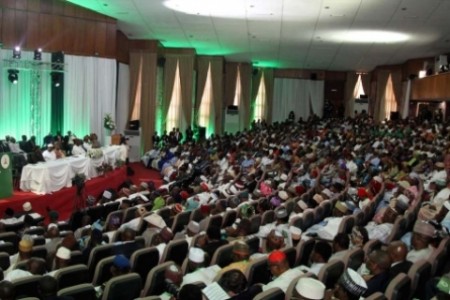
Delegates from the South have been routing for resource control and fiscal federalism.
A disagreement over resource control, fiscal federalism, and devolution of powers has pitched delegates against each other as the National Conference commenced committee sittings on Tuesday.
The situation degenerated to a stage where two delegates, Dara Godini, a professor and Vice Chancellor, Delta State University, and a delegate from the North hurled insults at each other for talking opposing positions on resource control.
“You are not fit to be a professor. I would have been a better professor than you ten years ago if I had wanted to,” the Northern delegate said.
“You didn’t need it because you couldn’t afford it. Professorship is not a child’s play and that is why people like you cannot get it,” Mr. Godini replied him.
It took the intervention of other delegates before the two antagonising
members went their different ways while still bickering on the issue in dispute.
Mr. Godini said the imperialists, apparently referring to Northern leaders, have held back Nigeria for so long, adding that the country cannot make any meaningful progress with its present socio-political and economic structure.
Continuing, he said, “They always refer us to Iran and would not talk about the United States where we copy our democracy from. We will not accept it this time around. We cannot claim to practice federalism when we are not.”
Trouble started early in the day when the Co-Chairman of the Committee on Devolution of Power, and former Governor of Akwa Ibom State, Victor Attah, addressed members of the committee.
Mr. Attah had at the inaugural session insisted that the excessive power wielded by the Federal Government must be reduced if the nation must make meaningful progress.
To understand the need for proper devolution of power, the former governor suggested that his colleagues take time out to study the Amalgamation document of 1914 and the Henry Willinik Commission report of 1957.
He also referred them to study former Head of State, Yakubu Gowon’s 1966 Speech after the coup and the report of former President Ibrahim Babangida’s National Political Bureau of 1987.
“If we keep this at the back of our mind, we will make progress,” the former governor said.
But just as Mr. Attah finished speaking and Mr. Coomassie, the co-chair of the committee held the floor, the former IGP subtly kicked against any attempt to tilt the balance of power from the Federal Government.
Calmly, he said that the focus of the Committee is to decide whether a huge political and economic power should remain at the centre or should be decentralized.
He was quick to add that deliberations by the Committee should be based on the belief that any government without economic power was bound to fail.
Mr. Coomassie said, “If you have government, and you don’t have the resources, then you cannot serve the people.”
He said ethnicity and religion will cease to play a significant role in Nigeria after the Conference. He urged the Committee members to listen to and respect the views expressed by members so that decisions can be based on consensus.
After the mild disagreement, the Committee went ahead to discuss its working document until it went on lunch break.
But after the resumed sitting in the afternoon, the voices of members were heard outside the locked doors as they shouted at one another.
At a point, Mr. Attah’s voice was heard ringing out so loud that reporters rushed to nearby windows and doors to eavesdrop on what was going on inside.
A member of the Committee who pleaded not be named because he is not competent to speak publicly on the matter said the trouble was with resource control.
He said, “The trouble with the two delegates started when we got to resource control. Some delegates don’t want us to talk about resource control while others insist that the issue must be discussed and a position taken.
“We did not even go far into the issue when some delegates became furious and tried to stop the debate. The matter was put off till the next meeting tomorrow (Wednesday).”
Investigation shows that although delegates to the Conference agree on the need for major reforms to be effected in the country, most of the delegates from the North do not support any move that would starve states from the area of funds.
Many states in Nigeria are believed to not have the wherewithal to sustain their economy without
allocation from the Federation Account.
On the other hand, delegates from the South have been routing for resource control and fiscal federalism.
The Committee on Devolution of Power has as its focus: a review of legislative lists of all the tiers of government; and fiscal federalism with emphasis on revenue sharing, resource control, and sharing formula.

No comments:
Post a Comment